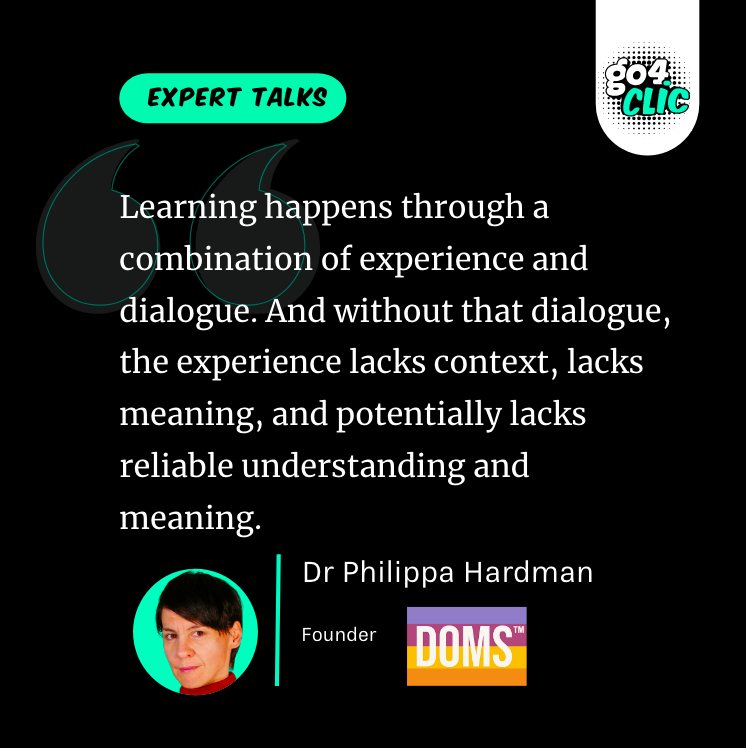The Future of Education: Evidence-based learning
During the podcast, we discussed the importance of creating learning experiences that involve connection and dialogue. Dr. Philippa Hardman (Founder DOMS) highlighted the challenges of designing effective learning experiences that prioritize social and collaborative learning. Also, she shared her experience working with educators and subject matter experts and how she learned that excluding them from the process can lead to suboptimal results. We also discussed the impact of artificial intelligence on the future of education and how it can be used to create more effective learning experiences.
The Learning Science Newsletter, Powered by DOMS™️
What was the training challenge you faced?
At the heart of our training challenge was the need to design effective learning experiences that prioritize social and collaborative learning.
We recognized that there is an increasing need for learners to engage in active, collaborative, and social learning experiences that enable them to work together to solve problems, compare their outputs, hold one another accountable, and motivate each other.
However, we also understood that designing such learning experiences is not straightforward. It requires a deep understanding of the principles of learning science, the pedagogical approaches that support social and collaborative learning, and the specific instructional strategies that sit underneath it.
Furthermore, it requires the involvement of educators and subject matter experts in the design process to ensure that the learning experience is both pedagogically robust and contextually relevant.
How/what was the innovation implemented?
To address this challenge, we implemented a lean co-creation process that involved educators and subject matter experts in designing and validating the learning experience. In this process, we worked closely with the educators and subject matter experts to understand their needs, goals, and motivations for the learning experience.
We then used this information to co-create a learning experience that prioritized social and collaborative learning while also adhering to the principles of learning science.
The co-creation process was iterative, and we constantly refined our design decisions based on feedback from educators and subject matter experts.
We also validated our design decisions by testing the learning experience with a small group of learners and adjusting the experience based on their feedback.

What were the results achieved?
The results of our innovation were significant. By involving educators and subject matter experts in the design process, we were able to create a learning experience that was more pedagogically robust and contextually relevant.
Furthermore, we were able to speed up the learning design process significantly while also getting better results. We also found that it was possible to bring stakeholders along on the journey without it having to take six months.
Ultimately, our approach led to a learning experience that prioritized social and collaborative learning and enabled learners to work together to solve problems, compare their outputs, hold one another accountable, and motivate each other. This approach resulted in a more engaging and effective learning experience that better met the needs of the learners.
What learning did you get? What would be different next time?
Through our innovation, we learned the importance of involving educators and subject matter experts in the design process to create more effective learning experiences.
We also learned the value of co-creation and iteration in the learning design process, as well as the importance of validating our design decisions with feedback from learners.
Looking ahead, we would be even more specific in our language when talking about social learning, ensuring that we’re referring to much more specific instructional strategies that sit underneath it. We would also continue to iterate and refine our lean co-creation process to ensure that we bring educators in early and often and that we validate our design decisions with them. Additionally, we would explore ways to leverage emerging technologies such as AI to further enhance the social and collaborative aspects of the learning experience.
Overall, we believe that a shift in the way we approach teaching and learning is necessary, emphasizing the importance of social and community-based learning experiences that prioritize connection and collaboration.
Bonus Track: What does the data evidence tell us about social, collaborative, or community-based learning experiences?
We had a hypothesis that a learning experience is better if it somehow involves a connection with others. However, one of the challenges we faced was that there isn’t a definitive or agreed definition of what social learning means. Sometimes people refer to a long recorded MOOC with a discussion at the end as a social learning experience, while other times it refers to more cohort-based, team-based working together.
I think it’s important to be specific in language when talking about social learning, and that the value of connected learning experiences lies in intrinsic motivation, accountability, and clarity of what needs to be done.



